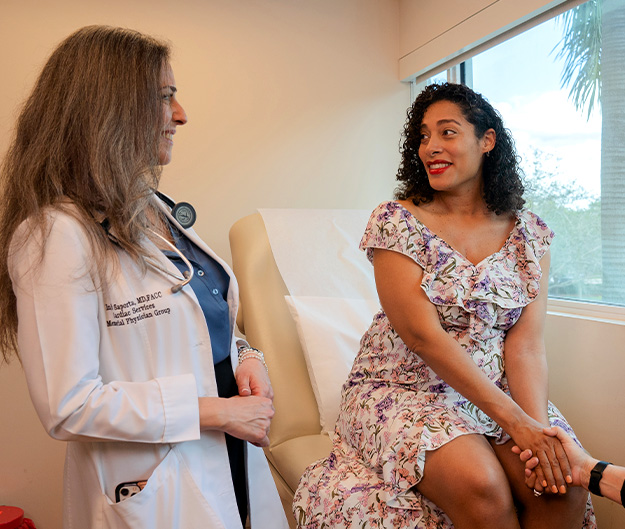
Women’s Lipid Disorders and Prevention Clinic
Our team specializes in detecting and treating high cholesterol and lipid disorders in women.
To find out more about our services or make an appointment.
954-265-7900High cholesterol and other lipid disorders are surprisingly common in women. These issues raise your risk of severe cardiovascular conditions, like heart attack and stroke. Timely detection and treatment from heart specialists at Memorial Healthcare System can help you live a long, healthy life.
What Are Lipid Disorders?
Your body naturally produces cholesterol, a waxy substance in all your cells. Cholesterol is one of many blood lipids. Others include fats and triglycerides.
High lipid levels can cause sticky plaque buildups that narrow blood vessel walls. When plaque builds up and cuts off blood supply to the heart, it causes a heart attack. If a piece of plaque breaks off, travels through the bloodstream and disrupts blood supply to the brain, it causes a stroke. Both conditions are preventable with early treatment from a specialized program like ours.
Why Women Need Specialized Lipid Disorder Care
Women typically have higher levels of good (HDL or high-density lipoprotein) cholesterol than men. However, lipid levels fluctuate due to sex hormones like estrogen. During and after menopause, HDL levels drop, and bad cholesterol (LDL or low-density lipoprotein) levels rise.
Memorial is one of the few South Florida programs specializing in women's unique heart health needs. Our depth of experience helps women at any stage of adulthood avoid cardiovascular complications.
Additional Risk Factors for Lipid Disorders in Women
In addition to sex hormones, other factors can increase a woman’s lipid disorder risk, including:
- Diet that’s high in saturated fats
- Having obesity
- Inactive lifestyle
- Smoking
- Other medical conditions, like diabetes, high blood pressure and hypothyroidism
Evaluations and Coronary Calcium Score Testing
Our women’s heart health specialists conduct a thorough evaluation to determine whether you have a lipid disorder or risk factors. We start by gathering information about your personal and family health history and performing a physical exam. You also undergo basic testing such as an electrocardiogram (EKG) to assess heart function and lab testing to measure lipid levels.
If you’re more likely to have a lipid disorder, we also perform coronary calcium score testing. It involves a special CT scan that shows calcium deposits in the coronary arteries. This information helps us assess your risk for developing cardiovascular disease and guide treatment with drugs like statins.
Find out more about heart calcium scoring.
Lipid Disorder Treatments and Heart Disease Prevention
If you have high cholesterol or lipid levels, we recommend lifestyle changes or treatments to help lower them. Lifestyle changes typically include eating a heart-healthy diet or increasing physical activity. When appropriate, we prescribe medications, like statins or nonstatin therapies, that help lower cholesterol levels.
Treatment can also include referrals to other Memorial specialists, such as endocrinologists, nutritionists, bariatric surgeons and psychologists. They can help address the cause of your symptoms so that preventive therapies work better.
Explore integrative heart health services for women.
Women’s Lipid Disorder Care: Why Choose Us?
When you come to Memorial for lipid screenings and treatments, you’ll find:
- Knowledgeable specialists: Cardiologists with a special interest in women’s heart health deliver the tests and treatments you need. We stay current with the latest research, helping you achieve exceptional results. Meet our team.
- Integrative approach: We help you access supportive services that address the underlying causes of lipid disorders. Offerings include weight-loss surgery for obesity, behavioral health, nutrition, endocrinology and diabetes services and more. These additional treatments can make it easier to reach your heart health goals.
- Cardio-obstetric care: You receive specialized obstetric services if a lipid disorder occurs during pregnancy. Since you can’t take statins during pregnancy, we recommend alternative methods that are safe for you and your growing baby. Find out more about our cardio-obstetrics clinic.
- Convenience: We take extra steps to make it easier to fit heart care into your busy schedule. You can schedule lab testing and review results via MemorialMyChart, our online patient portal. You can also use the portal to send your cardiologist a note between appointments or request a prescription refill.



